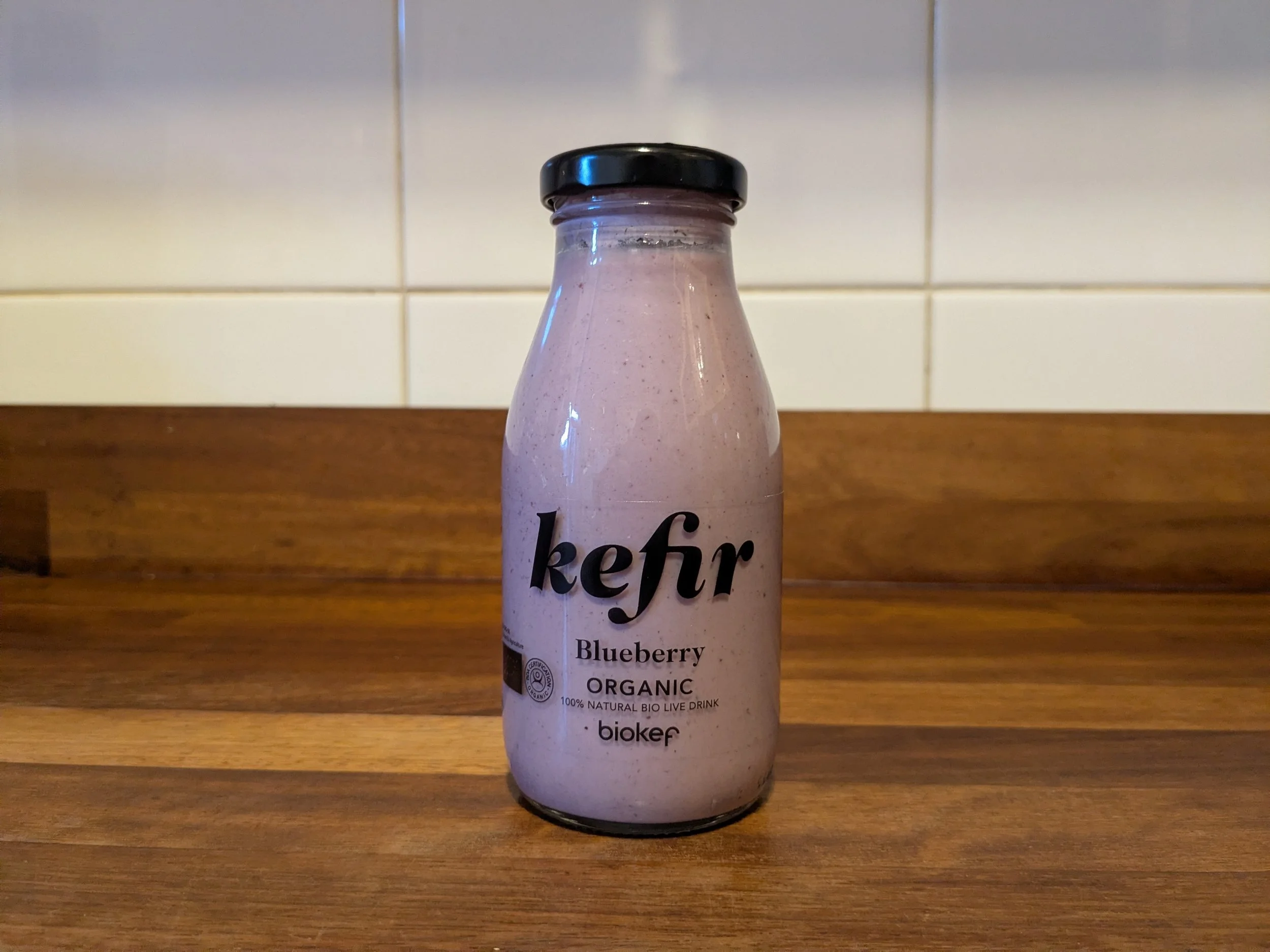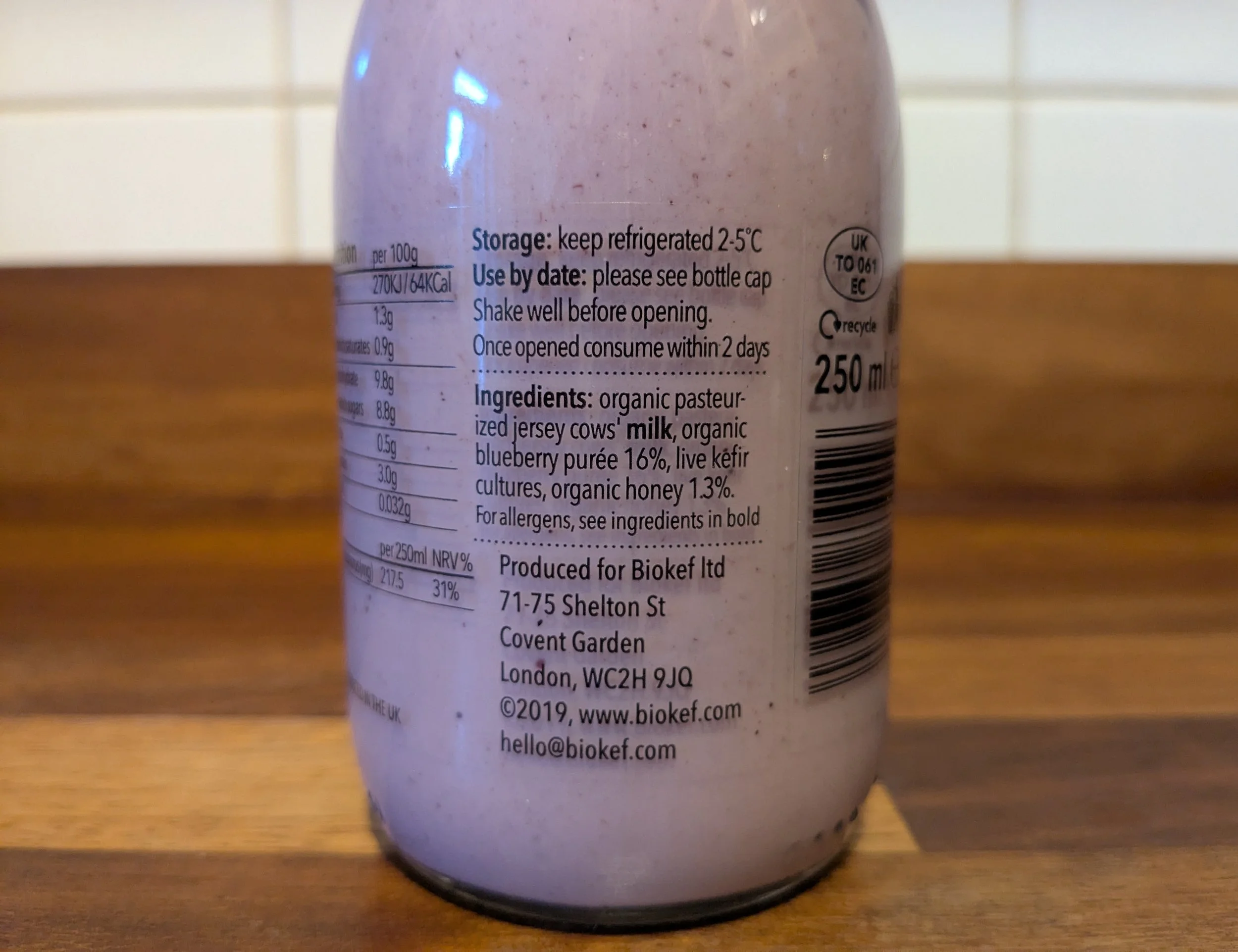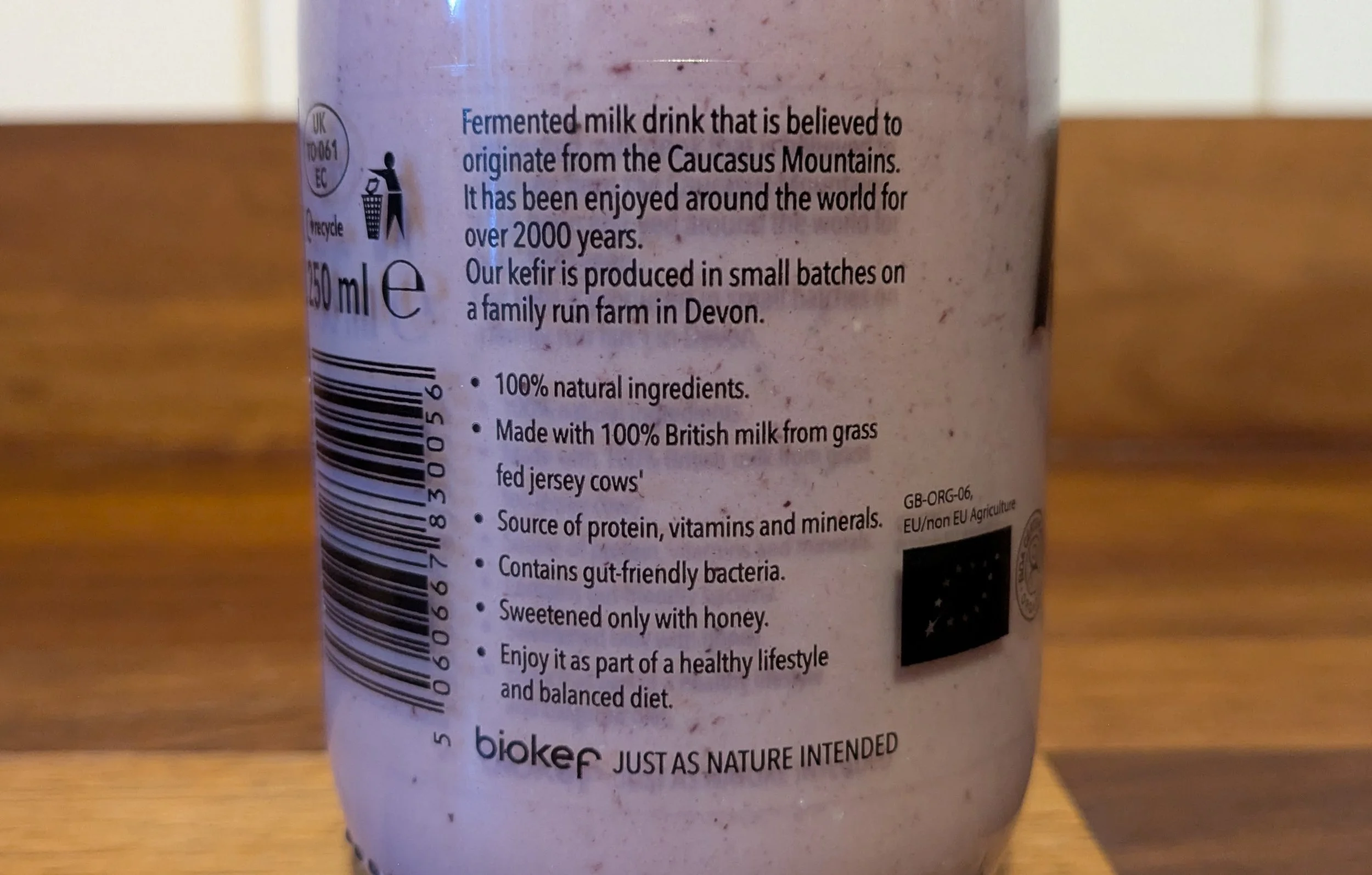Biokef kefir review
Here we will give a hands-on, taste-tested review of Biokef kefir. We’ll look into the benefits, ingredients, nutrition, use and taste of this flavoured kefir. We’ll also compare some health factors against other popular kefir.
For this review we have tested the blueberry version.
This kefir is available in some organic food stores in the UK.
You might also be interested in reading our article on the best probiotics in the UK if you want to add more healthy microbes to your diet.
About kefir
When most people think of kefir, they’re referring to dairy kefir – a fermented milk drink traditionally made by adding kefir grains (clusters of bacteria and yeast living in natural symbiosis) to milk. The result is a tangy, drinkable dairy product similar to yoghurt but thinner in texture.
Because it’s fermented with a diverse community of microbes, dairy kefir has a distinctive flavour and texture that set it apart from yoghurt. It can be enjoyed on its own or added to cereal, smoothies or dressings. The fermentation process also breaks down much of the milk sugar, giving it a slightly lower lactose content than milk.
There’s also water kefir, made by fermenting a sugar-water solution with water kefir grains – a related but distinct culture from dairy grains. Water kefir is a sparkling, dairy-free drink often flavoured with fruit or herbs. Although it contains different species of bacteria and yeasts, it follows the same natural fermentation process as dairy kefir.
However, many commercial kefirs – both dairy and water – are not made with traditional grains. Instead, they’re produced by inoculating the liquid with a selected mix of bacterial and yeast strains. This simpler method creates a controlled, consistent product but lacks some of the microbial diversity and complexity of true grain-fermented kefir. As a general rule, if a kefir is traditionally made it will mention ‘kefir grains’ on the label.
So it’s worth paying attention to how your kefir is made - and we’ll explore how this particular kefir is made in this review.
Read more about the benefits of kefir and how it differs to yoghurt.
Ingredients of Biokef kefir
This kefir has only organic ingredients. Because it is flavoured, it has more ingredients than traditional kefir which would only have milk and kefir grains.
The ingredients in Biokef are pasteurised Jersey cow milk, blueberry purée (16%), live kefir cultures and honey (1.3%).
So while all ingredients are simple and organic, the blueberry and honey do increase the sugar content which we’ll discuss below.
Our favourite gut health products in the UK
YourBiology Gut+ probiotic not only offers 10 strains of probiotics, but also includes two types of prebiotics, three digestive enzymes and vitamin D for gut health support. All this means it offers a lot more benefits for gut health and general health than most probiotic supplements do
Healthpath gut health test is the UK’s most comprehensive gut health test. It tests over 100 biomarkers, checks your digestion and immune response, analyses leaky gut and provides a clear and understandable report on your microbiome
YourBiology SuperGreens+ is a superfood and greens supplement which makes it very easy to get a huge amount of nutrition - vitamins, minerals, amino acids, fibre, polyphenols and more - in one glass. Great for supporting gut health, skin health, energy, mental clarity and immunity.
Read more about the best gut health products in the UK.
Benefits of Biokef kefir
For context, we’ll compare a few key factors against Yeo Valley kefir which is a popular kefir in the UK.
Live cultures
Unfortunately details of the production process and live cultures are scarce. The label only states that this kefir includes ‘live kefir cultures’ (without listing any specific strains) and doesn’t mention the use of kefir grains. This strongly suggests to me that it isn’t traditionally made with kefir grains, but rather it is inoculated with various strains.
In comparison, Yeo Valley kefir contains 14 strains of live cultures.
In terms of the actual amount of live cultures present (ie colony forming units), both brands don’t give any specific information on this.
Learn more about the benefits of probiotics.
Other health measures
Except in terms of fat, Biokef doesn’t compare favourably against Yeo Valley kefir in terms of key health measures.
Protein: This kefir has moderate protein levels at 3%. Yeo Valley is higher at 4%.
Sugar: Its sugar content is very high at 8.8%, which is far above Yeo Valley’s already quite high level of 5.7%. It’s worth noting that Biokef’s sugar level is more than double some other kefir we have reviewed.
Fat: It has low levels of fat for a kefir at 1.3%, which is under that of Yeo Valley (1.9%).
Calcium: Unfortunately Biokef doesn’t list its calcium content. Whereas Yeo Valley’s has moderate levels of calcium at 126mg per 100ml.
Appearance
As the picture below shows, it has a pale purple appearance with bits of blueberry throughout. The uneven level of the drink also suggests it’s going to have a nice thickness.
Texture
The texture is indeed thick and doesn’t have lumps. There is nice light effervescence which typically comes from yeast cultures.
Flavour
The aroma is mainly of blueberry with a bit of the vodka boozy character you often find in traditional kefir. (This is not a bad thing!)
The taste mirrors the aroma closely. There’s a nice blueberry taste with a background of subtle booziness. The honey isn’t obvious but you get the sweetness it brings. The acidity is low to moderate.
Overall, the taste is great and not as sweet as I had feared. While it’s likely not made traditionally with kefir grains, it at least has some character of traditional kefir with the effervescence and booziness.
Use
This flavoured kefir would be best had on its own or added to cereal or smoothies (if you can afford that…).
It likely wouldn’t work well in a dressing or marinade.
Cost of Biokef kefir
We bought a 250ml bottle from an organic food store in London for £4.20. On a per ml basis, this makes it among the most expensive kefir we have reviewed.
Summary
Rating: 4 stars out of 5.
Verdict: Biokef kefir is an organic, flavoured kefir with a great taste. It is very expensive though and needs more information on its live cultures.
Pros
organic ingredients
low in fat
great flavour
Cons
high in sugar
likely not made traditionally with kefir grains
no information on the types of live cultures present
no information on the actual number of live cultures present (ie colony forming unit count)
no information on calcium content
very expensive on a per ml basis
Now read about the best kefirs in the UK!
Other benefits of kefir
Vitamins and minerals
Kefir is a source of various vitamins and minerals including:
calcium
B vitamins (B12 and riboflavin)
magnesium
potassium
phosphorous
These vitamins collectively support bone health, energy production, muscle function, immune function and cardiovascular health.
Live cultures
Live cultures in kefir may help support digestion by aiding lactose breakdown and contributing to a balanced gut microbiome. Evidence varies by strain, so any benefits depend on which specific bacteria or yeasts are present.
Postbiotics
Postbiotics are beneficial compounds produced during fermentation and may help support gut health by maintaining a healthy gut environment. Their effects can differ between products, and research is ongoing into how these compounds contribute to digestive wellbeing.
Reduced lactose
Because of the strong fermentation of milk sugars by a diverse range of bacteria and yeasts, kefir is better for people with some degree of lactose intolerance compared to milk or yoghurt.
Our favourite gut health products in the UK
YourBiology Gut+ probiotic not only offers 10 strains of probiotics, but also includes two types of prebiotics, three digestive enzymes and vitamin D for gut health support. All this means it offers a lot more benefits for gut health and general health than most probiotic supplements do
Healthpath gut health test is the UK’s most comprehensive gut health test. It tests over 100 biomarkers, checks your digestion and immune response, analyses leaky gut and provides a clear and understandable report on your microbiome
YourBiology SuperGreens+ is a superfood and greens supplement which makes it very easy to get a huge amount of nutrition - vitamins, minerals, amino acids, fibre, polyphenols and more - in one glass. Great for supporting gut health, skin health, energy, mental clarity and immunity.
Read more about the best gut health products in the UK.
Your reviewer
This review was written by Travis, founder of Hello Gut Health.
A long-time gut health writer and advocate with over ten years of experience exploring the science of the microbiome and fermentation.
He combines careful research with practical testing to help readers make informed, trustworthy choices.
He has reviewed over 150 gut health products.








